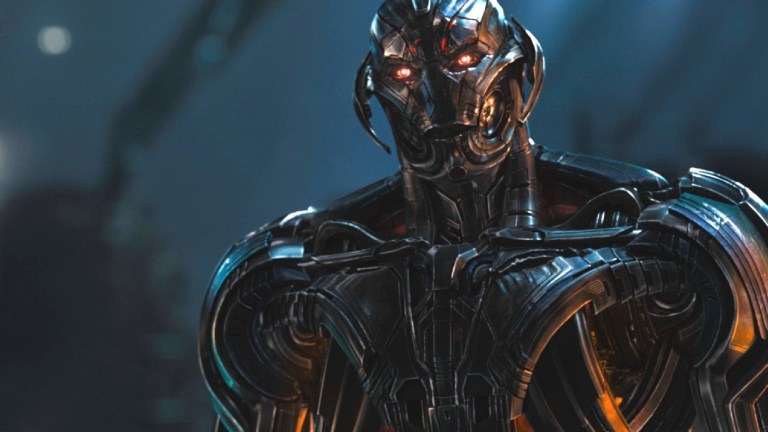It’s Time to Admit That Ultron Is One of the Best MCU Villains Ever
With Ultron coming back for the Vision TV series, it's time for the evil AI to get its due.

Ultron’s coming back, just like he always does. Any good Marvel Zombie knows that the Avengers can never defeat Ultron for good. He always makes a comeback, upgrading himself to fight his “father” Hank Pym in a different way each time.
So it shouldn’t be too much of a surprise that Ultron’s reportedly slated to return for Vision, an upcoming Disney+ series from Picard season three showrunner Terry Matalas. To be sure, some fans didn’t love James Spader’s snarky take on the domineering robot in 2015’s Avengers: Age of Ultron. But after nearly a decade since his big-screen, it’s time to give Ultron his due as one of the MCU’s best villains.
Ultron Goes Online
“You may have eluded me this time, Avengers… But there are other ways of striking at you… more deadly ways! And you shall die… by the hand of Ultron-5!”
That declaration from the end of Ultron’s first appearance in 1968’s Avengers #55, written by Roy Thomas and illustrated by John Buscema, set the model for all of the villain’s appearances to follow. An AI invented by Hank Pym aka Ant-Man, Ultron became self-aware and started upgrading himself, hoping to prove himself to his father by defeating the Avengers.
That constant need to upgrade and the connection to a founding Avenger made Ultron one of the team’s most compelling villains. From his initial, kind of corny (but lovable!) attacks in the Silver Age to Modern Age classics such as The Ultron Imperative and Annihilation: Conquest, Ultron presents a continuing challenge for the Avengers, a bad guy who cannot be defeated forever and who represents the team’s failing as heroes.
Although it met with mixed reviews from fans at the time, Avengers: Age of Ultron captured both of these elements. Throughout the movie, Ultron upgrades, going from a rickety Iron Man sentry to a more towering model, trying to remake himself in Vibranium. Hank Pym wouldn’t make his debut until Ant-Man later that year, so Age of Ultron made Ultron an invention of Tony Stark instead.
That change garnered the most fan complaints, as viewers took exception to Stark being the main character of the MCU and resulted in Ultron having much more snark than his comic book equivalent.
While those complaints have merit, they miss the good things that Ultron brought to the MCU. More than any other baddie, Ultron represents the dark side of the Avengers’ mission.
The Dark Side of an Avenger
“I see a suit of armor around the world,” Tony Stark tells Bruce Banner at the start of Avengers: Age of Ultron. That line captures the second act of Tony Stark’s life. Once his initial journey towards selflessness ended in Iron Man 3, Tony took the next step of trying to protect everyone he loved, solving the problems that no one had even thought of yet. That obsession will, of course, lead him to sign the Sokovia Accords and fracture the team, as seen in Captain America: Civil War. It will also drive him to fight Thanos and eventually sacrifice his life in Avengers: Endgame.
But in Age of Ultron, it was the natural step for Iron Man, who built Ultron in secret as the ultimate deterrent against evil. What if, instead of avenging evil that was done, he could prevent it? What if he could save the world before it needed saving?
Those are the questions that lead to Ultron’s creation, and lead to his turning against the Avengers. Programmed to save the world, Ultron comes to a logical conclusion. Humanity threatens the world, thus humanity must be contained to save the world. That motivation highlights the dark side of the team’s central ethos, showing how easily their mission could slip toward annihilation and totalitarianism.
Ultron’s motivation also puts him alongside the best of the MCU villains. Loki shows what happens when those with exceptional abilities embrace their power and put themselves over others. Killmonger shows what happens when a need to protect one’s self turns into attacking others. Kingpin shows what happens when tragedy drives someone to remake the world into something that feels safe.
Ultron presents the Avengers with a dark reflection of themselves, a nihilistic devotion to order, complete with dialogue that’s too clever by half. To defeat him, they must change themselves.
The Evolving Order
After a huge battle between the Avengers and Ultron’s drones, complete with a falling city and a sequence right out of a comic book splash page, Age of Ultron climaxes with Ultron debating the nature of humanity with his own creation, the synthezoid Vision.
“Humans are odd,” observes Vision. “They think order and chaos are somehow opposites and try to control what won’t be. But there is grace in their failings. I think you missed that.”
Ultron’s not the only one who missed that. The Avengers did too, and Ultron exposed the problem, driving them to be better heroes.
When Ultron makes his return in Vision, he will have learned that lesson as well. Coming back as an upgrade from the earlier version, he’ll present a whole new host of problems, which will plague the newly-reformed Vision even more than the alternative self he fought at the end of WandaVision.
And in those challenges, Ultron will hopefully help Vision evolve, pushing him forward into a new and better hero. Because that’s what great villains do, and Ultron is one of the best.
Vision comes to Disney+ in 2026.
